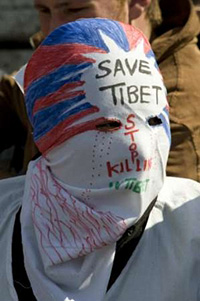
|
 |
 |
 Editorials | Issues | April 2008 Editorials | Issues | April 2008  
A History of Olympic Troubles
 Zeenews Zeenews
go to original


| | Pro-Tibet demonstrators shout slogans as the Olympic torch is carried in Paris April 7, 2008. Eighty Olympic torch relay runners cover 28 km (17 miles) from the Eiffel Tower to the Charlety stadium in the French capital. (Reuters/Philippe Wojazer) | | |
The controversy surrounding the Beijing Olympics may come as shocking news for those people who don’t want politics to be mixed with sports. But the fact is that there were numerous instances in the past, where people used Olympics either as a mark of protest to raise human rights issues or to gain political mileage.

The history of protests finds its roots first way back in 1980, when Ireland, after being denied independence by Britain boycotted the London Games. On a smaller scale, the US team refused to dip its flag to King Edward VII in the opening ceremony.

Berlin 1936

The Nazis led by Hitler used the Games as propaganda politics. There were calls for boycotts - and actual boycotts by some Jewish athletes.

Cold War Troubles

During the Cold War, the world saw the maximum number of protests. The Soviet athletes stayed on their side of the border and only came to participate in the Games in Helsinki Olympics in 1952.

Then there was Suez invasion controversy in 1956, as a result of which, Middle East countries like Egypt, Iraq and Lebanon did not take part in the Melbourne Game. The Cold War had an impact when the Netherlands, Spain and Switzerland refused to go because of the Soviet crushing of the Hungarian revolution.

Tokyo in 1964 saw boycotts from Indonesia and North Korea over an argument about their athletes competing in some rival games and South Africa was banned because of its racial policies.

Mexico's 1968 Games were marked by two very different protests. In the first, students demonstrated against the government about ten days before the Games and were fired on by the Mexican army. More than 200 students were killed.

Munich 1972

It’s the most tumultuous Games in the history in which protest turned violent.

Gunmen from the Palestinian Black September group got into the Israeli compound by climbing over an unguarded fence. In the end, eleven Israeli athletes had been murdered. The Games paused for a memorial event - and then went on.

The big boycotts

But the biggest boycott of the history of Olympics came in 1980, when as many as 62 countries led by the USA stayed away from the Moscow Olympics in protest of Soviet invasion in Afghanistan during the previous year.

US tasted the treatment of their own medicine when Eastern Block led by Russia kept them away from Los Angeles Games in 1984. | 
 | |
 |



